牛津高中英语模块八第一单元阅读部分教案
高中英语-Unit1-《The-phantom-of-the-opera》-reading教案-牛津
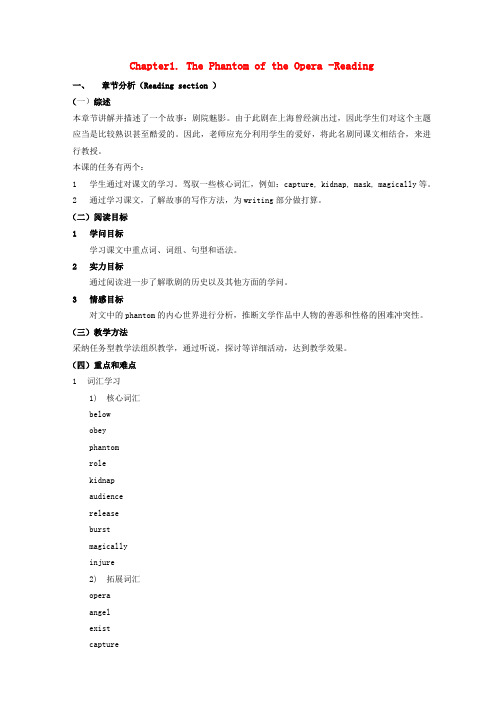
Chapter1. The Phantom of the Opera -Reading一、章节分析(Reading section )(一)综述本章节讲解并描述了一个故事:剧院魅影。
由于此剧在上海曾经演出过,因此学生们对这个主题应当是比较熟识甚至酷爱的。
因此,老师应充分利用学生的爱好,将此名剧同课文相结合,来进行教授。
本课的任务有两个:1学生通过对课文的学习。
驾驭一些核心词汇,例如:capture, kidnap, mask, magically等。
2通过学习课文,了解故事的写作方法,为writing部分做打算。
(二)阅读目标1学问目标学习课文中重点词、词组、句型和语法。
2实力目标通过阅读进一步了解歌剧的历史以及其他方面的学问。
3情感目标对文中的phantom的内心世界进行分析,推断文学作品中人物的善恶和性格的困难冲突性。
(三)教学方法采纳任务型教学法组织教学,通过听说,探讨等详细活动,达到教学效果。
(四)重点和难点1词汇学习1)核心词汇belowobeyphantomrolekidnapaudiencereleaseburstmagicallyinjure2)拓展词汇operaangelexistcapture3)词组和短语a huge building, with seventeen floorsforce him to leave homemake a secret home for sbgain power overmust bebe crowded within the endbe filling with waterbe shocked atmake sb do4)句型学习1. In the middle of this lake was an island, and on that island, one hundred yearsago, lived the Phantom2. …,he was so ugly that his own mother made him wear a mask,…教学设计(Teaching Designs)解。
牛津高中英语模块8Unit1Grammarproject语言点讲解
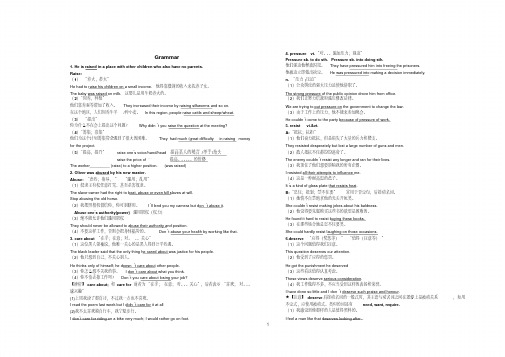
Grammar1. He is raised in a place with other children who also have no parents.Raise:(1)“养大,带大”He had to raise his children on a small income. 他得靠微簿的收入来抚养子女。
The baby was raised on milk. 这婴儿是用牛奶养大的。
(2)“饲养,种植”他们靠养蚕等增加了收入。
They increased their income by raising silkworms and so on.在这个地区,人们饲养牛羊/种小麦。
In this region, people raise cattle and sheep/wheat.(3)“提出”你为什么不在会上提出这个问题?Why didn’t you raise the question at the meeting?(4)“筹集;募集”他们为这个计划筹集资金遇到了很大的困难。
They had much /great difficulty in raising money for the project.(5)“提高,提升”raise one’s voice/hand/head 提高某人的嗓音/举手/抬头raise the price of …提高。
的价格The worker_________ (raise) to a higher position. (was raised)2. Oliver was abused by his new master.Abuse: “虐待;凌辱,”“滥用;乱用”(1)奴隶主有权任意打骂、甚至杀害奴隶。
The slave-owner had the right to beat, abuse or even kill slaves at will.Stop abusing the old horse.(2)我把照相机借给你,你可别瞎用。
牛津高中英语模块8Unit1 M8U1词组 Reading词组 全

M8u1 词组1.the antiques of the literary world 文学世界的古董2.examples of great writing and wisdom 杰出的创作及智慧的典范3.Their language characteristics are quite different from those of modern works.它们的语言特色与现代文学作品有相当大的区别。
4.gather dust on shelves 在书架上落满灰尘5.have nothing to do with 与……无关6.have a place in the world 在世界上占有一席之地7.adapt … from … / be adapted from 从…改编8.an award-winning film based on the novel Emma 根据小说Emma改编的获奖影片e out10.contemporary life11.one chapter at a time12.Some were later performed on stage. 有些后来被搬上了舞台。
13.soap opera14.His tomb reads, “By his death, one of England’s greatest writers is lost to the world.”他的墓碑上写着:“他的辞世令世界失去了一位最伟大的英国作家。
”15.be set in16.in the early 1800s17.abuse sb. 虐待某人 abuse one’s power and authority 滥用职权18.would do … rather than do … / prefer to do … rather than do …19.a twist in the plot 情节上的曲折20.give sb. a large fortune 赠与某人一大笔财富21.as a condition for receiving the fortune 作为获得这笔财富的一个条件22.before long 不久之后23.be ashamed of his background 对他的身世感到羞愧24.have rigid ideas of what it means to be civil 对于文明的内涵有着刻板的理解25.be bent on doing sth.26.win one’s love / have one’s love27.a fancy education 一个华而不实的教育28.a desperate criminal / a criminal on the run 一个铤而走险的罪犯29.along with 与…一道;除了…还有30.The film begins (in) the same way as the novel does. 这部电影与小说以同样的形式开始。
高中英语牛津版模块八第一单元阅读1说课稿.doc
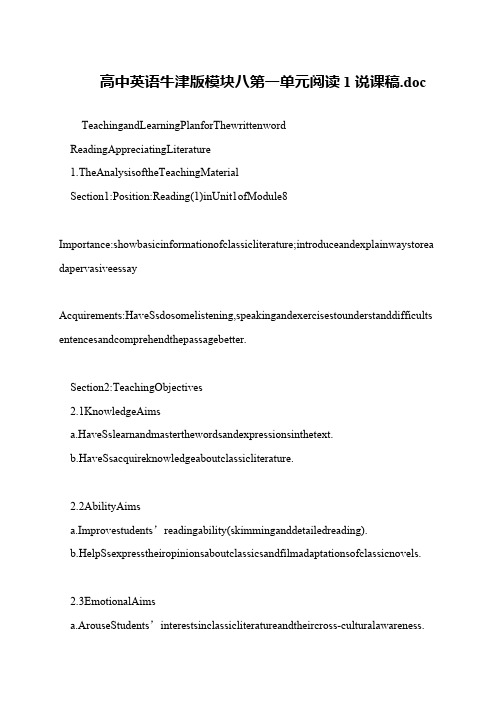
b.DevelopStudents’abilityofco-operationthroughgroupdiscussion. Section3:TeachingKeyPointsandTeachingDifficulties a.Learnandmasterreadingskills. b.Trainstudents’speakingability. 2.TeachingMethods a.Skimmingreadingtograspageneralideaofthetext. b.Detailedreadingtogetthedetailedinformation. c.Asking-and-answeringquestionstohelpSsunderstandthetextexactly. d.Groupworktomakeeverystudentattendtheclass. 3.Learningmethod a.Sshaveknownsomethingaboutclassicliteraturebyobtaininginformationfromthecom puter. b.Ssdon’ toftenuseEnglishtoexpressthemselvesandcommunicatewithothers,sotrytoencouraget hemtocooperatewithothers. c.Somestudentsarenotactiveintheclassbecausetheyareafraidofmakingmistakesandthe reforeIwillcreateaneasyatmosphere. 4.Teachingprocedures
2.DetailedReading HaveSslistentothetextandreadafteritwithtasksinPartC1. (设计说明:让学生完成课文的精听与精读,可促进学生听与读的技能培 养,并通过任务布置,提高学生自主完成目标任务的能力,积极响应新课标 要求。) Step4Post-reading(18mins) 1.Discussion(10mins) anizeSsintogroupsoffourandaskthemtodiscussthefivemainelements(characters, setting,symbols,theme,andplot)ofthenovelGreatExpectations. b.HaveSsthinkofsomepossibleendingsforthenovelandreporttheiranswersintheclass. (设计说明:两组讨论中第一组设置了有结构问题,进一步培养学生阅读及 总结能力,第二组设置了无结构问题,可激发学生的发散思维能力;同时, 通过分组讨论的形式可提高学生英语表达能力,团队协作的能力,有助于进 一步提高学生对英国文学的鉴赏能力。) 2.Consolidation(8mins) AskSstofinishtasksinPartEindividually,andchecktheanswersasaclass. (设计说明:通过连线和选词填空的练习方式巩固重点词汇和语篇感知能 力,引导学生将所学内容进行输出和反馈。) Step5Homework(3mins) a.ReadthetextagainandtrytoretellthestoryofGreatExpectations. b.Thinkofsomepossibleendingsforthenovelandwriteitdown.
牛津英语模块八第一单元Reading
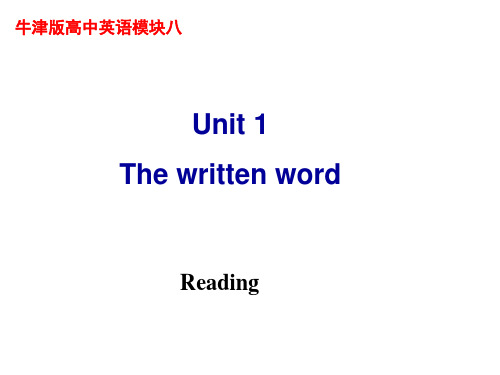
5. Who gives Pip a lot of money? A stranger. 6. What kind of person does Pip become after he moves to London? He becomes vain and ashamed of his background.
注意:若名词前的 解释为“ 的 意 注意:若名词前的little 解释为“小(的)”意 则仍用such,而不能用 。当that ,而不能用so。 思 时,则仍用 前是单数可数名词且该名词前面有形容修饰 可以互换, 时,so与such可以互换,即:so+adj.+ 与 可以互换 + + a/an+n.=such+a/an+adj.+n.。 例如: + + + + 。 例如: She is so good a teacher that we all love her. =She is such a good teacher that we all love her. 前是不可数名词或复数可数名词时, 当that前是不可数名词或复数可数名词时, 前是不可数名词或复数可数名词时 则必须用such,不能用 来代替。 来代替。 则必须用 ,不能用so来代替
1) so…that… 如此……以至于…… 如此……以至于…… ……以至于 so...that 和 such...that 的意思均为“如 的意思均为“ ……以致……”, 以致…… 此……以致…… ,都用来引导结果状语 从句。 从句。 so...that 结构中的 so为副词,后面跟形容 为副词, 为副词 词或副词; 中的such为形容词, 为形容词, 词或副词;such...that中的 中的 为形容词 后面接名词(但名词前可以有形容词或副 后面接名词 但名词前可以有形容词或副 词修饰)。 词修饰 。
译林牛津版高中英语选修八Unit1Reading(1)(共15张PPT)

He uses the fortune (7) to move (move) to London and develops the shortcomings of being shallow and having prejudice, and even against his old companions. (8)However , by the end of the novel Pip has learned that wealth does not buy (9) happiness (happy) and that friends are more (10) important (importance) than a fancy education.
• 2. Avoidthe interference of the similar words.
Part II: Careful reading
1. According to the text, which of the following
is Not true?来自BA. All the classics were well written. L2
A. persuade readers to appreciate classic
literature
title & the 1st part
B. introduce Charles Dickens' novels to us
C. let readers know about Dickens
D. make a summary of Great Expectations
B. Oliver Twist was one of his famous novels.
牛津译林版高中英语选修八《Unit 1 The written word》 Grammar 教案 3
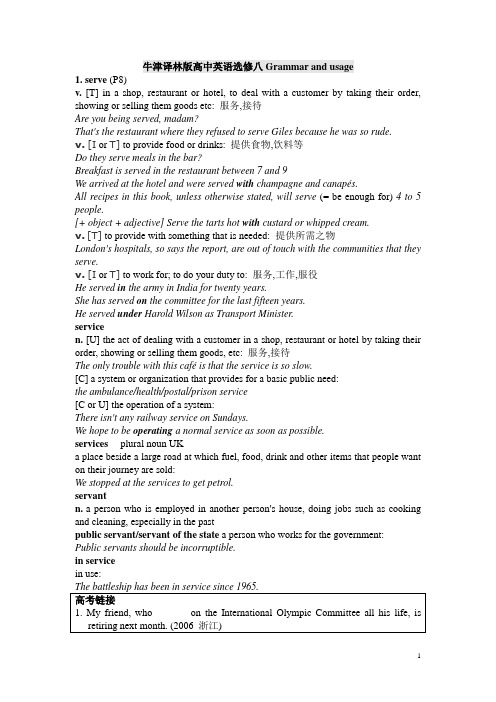
牛津译林版高中英语选修八Grammar and usage1. serve (P8)v. [T] in a shop, restaurant or hotel, to deal with a customer by taking their order, showing or selling them goods etc: 服务,接待Are you being served, madam?That's the restaurant where they refused to serve Giles because he was so rude.v.[I or T] to provide food or drinks: 提供食物,饮料等Do they serve meals in the bar?Breakfast is served in the restaurant between 7 and 9We arrived at the hotel and were served with champagne and canapés.All recipes in this book, unless otherwise stated, will serve (= be enough for) 4 to 5 people.[+ object + adjective] Serve the tarts hot with custard or whipped cream.v.[T] to provide with something that is needed: 提供所需之物London's hospitals, so says the report, are out of touch with the communities that they serve.v.[I or T] to work for; to do your duty to: 服务,工作,服役He served in the army in India for twenty years.She has served on the committee for the last fifteen years.He served under Harold Wilson as Transport Minister.servicen. [U] the act of dealing with a customer in a shop, restaurant or hotel by taking their order, showing or selling them goods, etc: 服务,接待The only trouble with this café is that the service is so slow.[C] a system or organization that provides for a basic public need:the ambulance/health/postal/prison service[C or U] the operation of a system:There isn't any railway service on Sundays.We hope to be operating a normal service as soon as possible.services plural noun UKa place beside a large road at which fuel, food, drink and other items that people want on their journey are sold:We stopped at the services to get petrol.servantn.a person who is employed in another person's house, doing jobs such as cooking and cleaning, especially in the pastpublic servant/servant of the state a person who works for the government:Public servants should be incorruptible.in servicein use:v. [T]1)to take care of a person, or an animal or plant, until they are completely grown: 抚养Her parents died when she was a baby and she was raised by her grandparents.The lambs had to be raised by hand (= fed artificial milk by people)when their mother died.The farmer raises (= breeds) chickens and pigs.The soil around here isn't good enough for raising (= growing) crops.2) to cause sth. to increase or become bigger, better, higher, etc: 抬高, 提高The government plan to raise taxes.I had to raise my voice (= speak more loudly) to make myself heard over the noise. The inspector said that standards at the school had to be raised.Our little chat has raised my spirits (= made me feel happier).3) to lift sth. to a higher position: 举起Would all those in favor please raise their hands?He raised the window and leaned out.Mary Quant was the first fashion designer to raise hemlines.3. abuse (9)v. [T] 1) to use or treat someone or sth. wrongly or badly, especially in a way that is to your own advantage: 虐待She is continually abusing her position/authority by getting other people to do things for her.I never expected that he would abuse the trust I placed in him.Several of the children had been sexually/physically/emotionally abused.2) to speak to someone rudely or cruelly: 辱骂The crowd started abusing him after he failed to save a goal.n. [U] rude and offensive words said to another person: 辱骂He had apparently experienced a lot of verbal abuse from his co-workers.He hurled (a stream/torrent of) abuse at her (= He said a lot of rude and offensive things to her).'Idiot!' is a mild term of abuse (= an insulting expression).child abusen. [U] when adults intentionally treat children in a cruel or violent way: 虐待儿童4. get caught (P9)v. [L + past participle] (getting, got, got or US gotten) sometimes used instead of 'be' to form the passive:I got shout ed at by some idiot for walking past his house.They're getting marri ed later this year.pressv. [I or T; usually + adv. or prep.] to push sth. firmly, often without causing it to move permanently further away from you: 按,压Press the button to start the machine.He pressed his face against the window.Can you press a bit harder on my shoulders, please?The crowd pressed against the locked doors trying to get into the building.Press down firmly on the lever.[T] to make clothes smooth by ironing them: 熨烫I'll just press these trousers.[T] to put a weight on fruit in order to remove the juice: 榨汁to press grapes[T] to make a record or CD: 制唱片Over 3000 copies of the CD were pressed and sent some out to college radio stations. [T] to make sth. flat and firm by putting it under sth. heavy: 压扁The children pressed some flowers.pressed turkey breastn. [C usually singular] a firm push against sth. using the fingers: 按,压To start the machine, just give this button a press.[S] when you make cloth smooth with an iron: 熨烫Can you give this shirt a quick press?[C] a piece of equipment which is used to put weight on something in order to crush it, remove liquid from it or to make it flat: 熨斗a garlic/trouser/wine pressto try hard to persuade someone to do something: 强迫,迫使[+ object + to infinitive] The committee pressed him to reveal more information.He's pressing me for an answer.Can I press you further on(= persuade you to say more about) this issue?pressuren. [U] the force you produce when you press sth.: 压力He put too much pressure on the door handle and it snapped.You can stop bleeding by applying pressure close to the injured area.[C or U] the force that a liquid or gas produces when it presses against an area:gas/water pressureThe new material allows the company to make gas pipes which withstand higher pressures.The gas is stored under pressure (= in a container which keeps it at a higher pressure than it would usually have).[U] when someone tries to make someone else do sth. by arguing, persuading, etc: 压力(抽象)public/political pressureTeachers are under increasing pressure to work longer hours.[+ to infinitive] Pressure to abandon the new motorway is increasing.The government is facing pressure from environmental campaigners.He only asked her under pressure from his wife (= because his wife forced him to). She's putting pressure on him (= trying to persuade him) to get married.FORMAL The international community are trying to bring pressure to bear on the government (= trying to persuade them) to resolve the situation.[C or U] a difficult situation that makes you feel worried or unhappy:She's got a lot of pressure on her at work just now.Be nice to him - he's been under a lot of pressure recently.Can you work well under pressure?n.[C] a suggestion that sth. unpleasant or violent will happen, especially if a particular action or order is not followed: 威胁[+ to infinitive] She carried out her threat to throw away any clothes that were left on the floor.The threat of jail failed to deter him from petty crime.Drunken drivers pose a serious threat (= cause a lot of harm) to other road users.He says he'll tell the authorities but it's just an empty threat (= it will not happen).be under threat of sth.to be in a situation where people are threatening you with sth. bad or unpleasant: 在……的威胁之下She left the country under threat of arrest if she returned.threatenv. [T] to tell someone that you will kill or hurt them, or cause problems for them if they do not do what you want: 威胁They threatened the shopkeeper with a gun.[+ to infinitive] They threatened to kill him unless he did as they asked.[I] If sth. bad threatens to happen, it is likely to happen: 预兆,征兆Look at those clouds! There's a storm threatening.[T] to be likely to cause harm or damage to sth. or someone: 对……造成威胁v. [I or T] to fight against sth. or someone that is attacking you: 抗拒……的诱惑The soldiers resisted (the enemy attacks) for two days.[T] to refuse to accept or be changed by sth.: 拒绝The party leader resisted demands for his resignation.He tried to run away from the police and was charged with resisting arrest.The new hybrid crops are much better at resisting disease.[T] to stop yourself from doing sth. that you want to do: 克制自己去做某事I can never resist temptation/chocolate/the urge to laugh.[+ ing form of verb] She couldn't resist laughing at him in those clothes.resistancen. [U] when sth. or someone resists:resistance to diseaseGovernment troops offered no resistance (to the rebels).There's a lot of resistance (= opposition) to the idea of a united Europe.[U] a force which acts to stop the progress of sth. or make it slower:The car's speed was reduced by air/wind resistance.[C or U] SPECIALIZED the degree to which a substance prevents the flow of an electric current through it:Copper has (a) low resistance.resistantadj. 1) not wanting to accept sth., especially changes or new ideas:Why are you so resistant to change?2) not harmed or affected by sth.:a stain-resistant carpeta disease-resistant variety of tomato。
高中英语新牛津译林版精品教案《Reading(1):Appreciating literature》
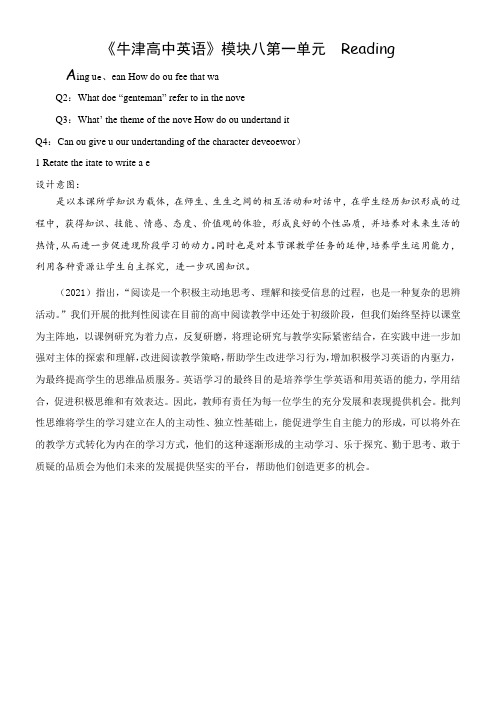
《牛津高中英语》模块八第一单元ReadingA ing u e、ean How do ou fee that waQ2:What doe “genteman” refer to in the noveQ3:What’ the theme of the nove How do ou undertand itQ4:Can ou give u our undertanding of the character deveoewor)1 Retate the itate to write a e设计意图:是以本课所学知识为载体,在师生、生生之间的相互活动和对话中,在学生经历知识形成的过程中,获得知识、技能、情感、态度、价值观的体验,形成良好的个性品质,并培养对未来生活的热情,从而进一步促进现阶段学习的动力。
同时也是对本节课教学任务的延伸,培养学生运用能力,利用各种资源让学生自主探究,进一步巩固知识。
(2021)指出,“阅读是一个积极主动地思考、理解和接受信息的过程,也是一种复杂的思辨活动。
”我们开展的批判性阅读在目前的高中阅读教学中还处于初级阶段,但我们始终坚持以课堂为主阵地,以课例研究为着力点,反复研磨,将理论研究与教学实际紧密结合,在实践中进一步加强对主体的探索和理解,改进阅读教学策略,帮助学生改进学习行为,增加积极学习英语的内驱力,为最终提高学生的思维品质服务。
英语学习的最终目的是培养学生学英语和用英语的能力,学用结合,促进积极思维和有效表达。
因此,教师有责任为每一位学生的充分发展和表现提供机会。
批判性思维将学生的学习建立在人的主动性、独立性基础上,能促进学生自主能力的形成,可以将外在的教学方式转化为内在的学习方式,他们的这种逐渐形成的主动学习、乐于探究、勤于思考、敢于质疑的品质会为他们未来的发展提供坚实的平台,帮助他们创造更多的机会。
全套教案-牛津英语模块八第一单元Module8Unit1教案
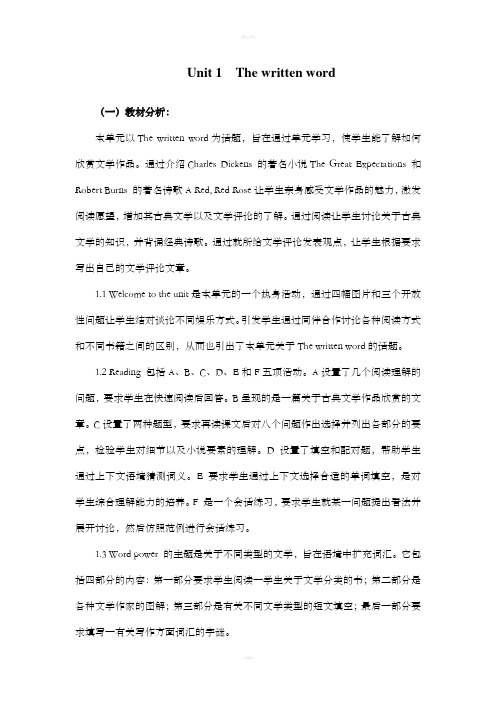
Unit 1 The written word(一)教材分析:本单元以The written word为话题,旨在通过单元学习,使学生能了解如何欣赏文学作品。
通过介绍Charles Dickens 的著名小说The Great Expectations 和Robert Burns 的著名诗歌A Red, Red Rose让学生亲身感受文学作品的魅力,激发阅读愿望,增加其古典文学以及文学评论的了解。
通过阅读让学生讨论关于古典文学的知识,并背诵经典诗歌。
通过就所给文学评论发表观点,让学生根据要求写出自己的文学评论文章。
1.1 Welcome to the unit是本单元的一个热身活动,通过四幅图片和三个开放性问题让学生结对谈论不同娱乐方式。
引发学生通过同伴合作讨论各种阅读方式和不同书籍之间的区别,从而也引出了本单元关于The written word的话题。
1.2 Reading 包括A、B、C、D、E和F五项活动。
A设置了几个阅读理解的问题,要求学生在快速阅读后回答。
B呈现的是一篇关于古典文学作品欣赏的文章。
C设置了两种题型,要求再读课文后对八个问题作出选择并列出各部分的要点,检验学生对细节以及小说要素的理解。
D 设置了填空和配对题,帮助学生通过上下文语境猜测词义。
E 要求学生通过上下文选择合适的单词填空,是对学生综合理解能力的培养。
F 是一个会话练习,要求学生就某一问题提出看法并展开讨论,然后仿照范例进行会话练习。
1.3 Word power 的主题是关于不同类型的文学,旨在语境中扩充词汇。
它包括四部分的内容:第一部分要求学生阅读一学生关于文学分类的书;第二部分是各种文学作家的图解;第三部分是有关不同文学类型的短文填空;最后一部分要求填写一有关写作方面词汇的字谜。
1.4 Grammar and usage 总结了否定句的分类、用法、构成和意义,并通过相关练习题帮助学生巩固对这种语法的掌握。
1.5 Task的主要任务是写出一文学评论文章,其中包含了3种技巧并分别设计了三个步骤帮助学生掌握这些技巧:第一了解听关键词找信息的方法;第二询问并发表观点;第三如何写文学评论文章。
牛津高中英语Unit1阅读学案学生版
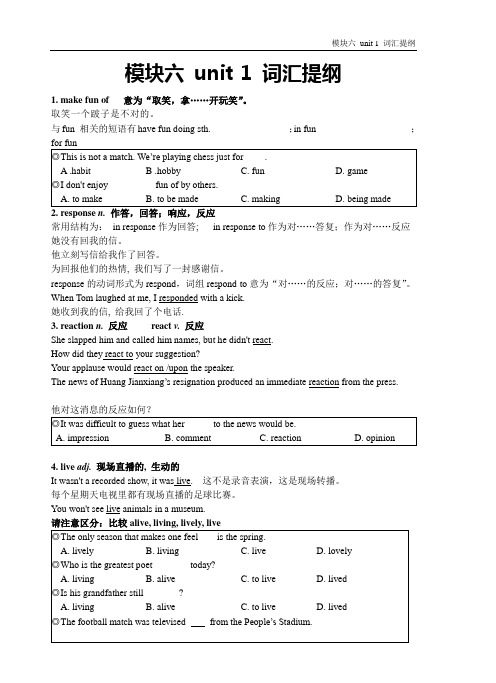
模块六 unit 1 词汇提纲1. make fun of 意为“取笑,拿……开玩笑”。
取笑一个跛子是不对的。
______________________________________________________与fun 相关的短语有have fun doing sth. ________________;in fun____________________;常用结构为:in response作为回答; in response to作为对……答复;作为对……反应她没有回我的信。
_____________________________________________他立刻写信给我作了回答。
____________________________________________________ 为回报他们的热情, 我们写了一封感谢信。
_______________________________________ response的动词形式为respond,词组respond to意为“对……的反应;对……的答复”。
When Tom laughed at me, I responded with a kick.___________________________________ 她收到我的信, 给我回了个电话. ________________________________________________ 3. reaction n.反应react v.反应She slapped him and called him names, but he didn't react._____________________________ How did they react to your suggestion? ____________________________________________ Your applause would react on /upon the speaker._____________________________________ The news of Huang Jianxiang’s resignation produced an immediate reaction from the press.____________________________________________________________________________ 他对这消息的反应如何?______________________________________________________4. live adj.现场直播的, 生动的It wasn't a recorded show, it was live. 这不是录音表演,这是现场转播。
高中英语-Unit1-《The-phantom-of-the-opera》-reading教案-牛津

高中英语-Unit1-《The-phantom-of-the-opera》-reading教案-牛津上海版S1B简介本篇教案适用于牛津上海版S1B高中英语教材的Unit1阅读任务,目的是使学生对于经典音乐剧《The Phantom of the Opera》有更深刻的了解,提高学生的英语阅读能力和文化素养。
教学目标1.能够理解和使用与音乐、旋律和歌唱相关的词汇;2.能够理解对话和文章中的关键词汇和句子,掌握阅读策略;3.培养学生的音乐文化素养和英语阅读能力,提高表达和交流能力。
教学过程预热(5分钟)通过师生互动的方式询问学生是否听过《The Phantom of the Opera》这个音乐剧,引导学生进入主题。
词汇预习(20分钟)根据学生的英语水平和词汇量,在黑板上或PPT上展示音乐、旋律和歌唱相关的词汇,并通过举例、配图等方式帮助学生记忆和理解。
阅读任务(35分钟)1.用PPT或黑板上展示文章《The Phantom of the Opera》的阅读任务和细节问题,使学生明确读文章的目的和策略;2.学生独立阅读文章,并按照目的和策略应对细节问题;3.分组或个别提问,让学生互相交流阅读体验和解决问题的方法。
拓展活动(20分钟)1.听音乐剧中的歌曲,看音乐剧片段,并讨论剧中的表演和音乐形式;2.通过小组合作的方式,设计一个独特的音乐剧观剧体验,并进行分享和反馈。
教学评价通过以下方式对学生进行教学评价:1.师生互动的方式询问学生在阅读过程中的感受和理解;2.收集学生答题卡、作业、已经课堂练习的评测结果;3.观察学生在小组讨论和合作中的表现和交流;4.根据教学目标评估学生的英语阅读能力和文化素养。
总结《The Phantom of the Opera》这一音乐剧经典,具有广泛的影响和吸引力,在英语阅读学习中也是一种很好的文化载体。
通过本次教学,学生在英语阅读能力和文化素养方面得到了增长和拓展。
高中英语新牛津译林版精品教案《Reading(1):Dying to be thin…》
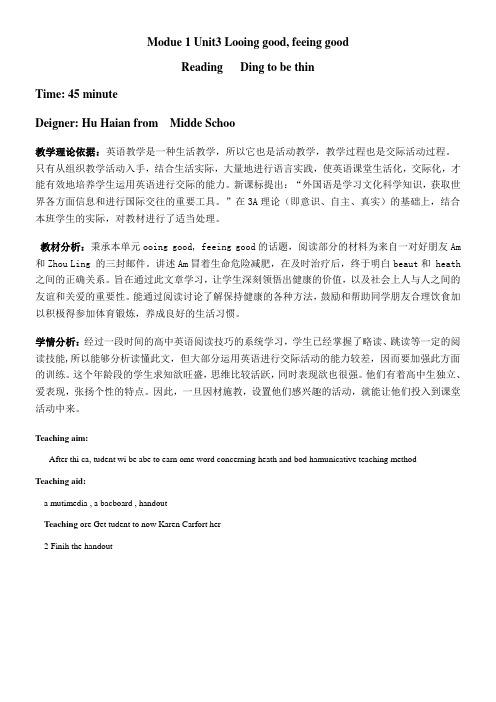
Modue 1 Unit3 Looing good, feeing goodReading Ding to be thinTime: 45 minuteDeigner: Hu Haian from Midde Schoo教学理论依据:英语教学是一种生活教学,所以它也是活动教学,教学过程也是交际活动过程。
只有从组织教学活动入手,结合生活实际,大量地进行语言实践,使英语课堂生活化,交际化,才能有效地培养学生运用英语进行交际的能力。
新课标提出:“外国语是学习文化科学知识,获取世界各方面信息和进行国际交往的重要工具。
”在3A理论(即意识、自主、真实)的基础上,结合本班学生的实际,对教材进行了适当处理。
教材分析:秉承本单元ooing good, feeing good的话题,阅读部分的材料为来自一对好朋友Am 和Zhou Ling 的三封邮件。
讲述Am冒着生命危险减肥,在及时治疗后,终于明白beaut和 heath 之间的正确关系。
旨在通过此文章学习,让学生深刻领悟出健康的价值,以及社会上人与人之间的友谊和关爱的重要性。
能通过阅读讨论了解保持健康的各种方法,鼓励和帮助同学朋友合理饮食加以积极得参加体育锻炼,养成良好的生活习惯。
学情分析:经过一段时间的高中英语阅读技巧的系统学习,学生已经掌握了略读、跳读等一定的阅读技能,所以能够分析读懂此文,但大部分运用英语进行交际活动的能力较差,因而要加强此方面的训练。
这个年龄段的学生求知欲旺盛,思维比较活跃,同时表现欲也很强。
他们有着高中生独立、爱表现,张扬个性的特点。
因此,一旦因材施教,设置他们感兴趣的活动,就能让他们投入到课堂活动中来。
Teaching aim:After thi ca, tudent wi be abe to earn ome word concerning heath and bod hamunicative teaching methodTeaching aid:a mutimedia , a bacboard , handoutTeaching ore Get tudent to now Karen Carfort her2 Finih the handout。
苏教出版牛津英语初级中学八年级上册精品教案全册

苏教版牛津英语初中八年级上册精品教案全册《牛津初中英语》8AUnit 1 Friends Checkout简要提示一、年级:八年级二、教学内容:8A Unit 1 Friends三、课型:Checkout四、教学目标1.知识目标1) 掌握与本单元描述人物特征话题有关的词汇及句型。
2) 掌握并能熟练运用形容词的比较级和最高级。
2.能力目标1) 能知道如何描述人的外貌。
2) 能用形容词来描述人物或事物。
3) 能掌握形容词的比较级和最高级。
五、教学重难点采用多种方法巩固、加深理解并熟练运用与本单元话题有关的语言点和语法。
教学流程Part One Language points revision (用时:18分钟)Step 1 Revision (用时:5分钟)We know this unit is about friends. 我们都知道这一单元的中心话题是关于朋友。
After learning this unit, we should know how to use adjectives to describe our friends’ general appearance, personality and abilities.学完这一单元后,我们应该知道如何用形容词来描写我们朋友的外貌、个性和能力。
And we should also learn to introduce our friends. 我们还应该学会介绍我们的朋友。
First, let’s look at these pictures and talk about them.首先,下面让我们来看这些图片并谈论他们。
A is strong.B is thin.A has big eyes.B has small eyes.A is short.B is tall.A has a square face.B has a round face.Step2 Practice (用时:5分钟)OK, now you’ll see three persons in a group. I’ll describe one of th em, listen carefully, then try to choose the right one.现在看这些人物,我将会描述他们,仔细听,从三副画中选择我所描述的人。
牛津版的高中英语教案设计5篇

牛津版的高中英语教案设计5篇牛津版的高中英语教案设计1(一) 明确目标1. Get the students to know the importance of body language.2. Train the students integrating skills.(二)整体感知Step 1Show more gestures and let the students guess the meanings. Step 2Read the integrating skills.(三) 教学过程Step 3Introduce Shuang huang.Step 4Work in pairs and make up a funny story.Step 5Practice Writing.(四)总结扩展Step 6Compare the meanings of body language in China and the USA. Meaning in China Body language Meaning in the USAwelcome a smile and a handshake welcomeHello Goodbye ! waving one s hand Hello! Hi! Goodbye!disagreement shaking the head disagreementagreement nodding the head agreementMay I ask a question putting up a hand May I ask a question.love kissing loveno such a gesture keeping ones fingers crassed hoping sth. goodwill happenproud holding up ones head not afraid/proudfeeling sorry for having done hanging ones head feeling sorry for having donefeeling very happy waving ones arm feeling very happydislike, disagreement or pain making a face dislike, disagreementor painIm full/ I v eat stomachache touching ones stomach having a stomachache(五)随堂练习1. Choose the best answers according to the situations.When you meet a foreign guest for the first time, you should say: A. How do you do B. How are youC. Hi!D. Hello! What can I do for you2. Yon are carrying some heavy boxes. Someone comes over to offer help. He may say Can I help you If you need his help, you should say: A. Of course, you can. B. Thats a good idea.C. Yes, go ahead.D. Thanks. Thats very kind of you.3. If you can carry the boxes yourself and don’t need his help,you should say to him:A. No. I don’t need your help.B. Its none of your business.C. No, thanks. I can manage it myself.D. Sorry, you can’t4. When you see an old lady carrying a heavy bag and want to goover to help her, you should say:A. Excuse me, madam. Would you like me to crazy it for youB. Hello! Let me carry the bag for you. It’s too heavy for an oldlady like you.C. Hi, Granny! Let me carry the heavy bag for you. You are old.D. Excuse me. Is there anything else I can do for you2. Choose the right words for the blanks, using the right verb forms.proud juice dining room realize were type comfortable.(1) I hope you feel as __ as you are at home.(2)The speaker ____ to the people in the hall before he left.(3)You’d better make the apples into ____ for your baby; otherwise she can’t eat them.(4) Before you send your article to the publisher, you’dbetter____ it out with a computer or a type-writer.(5)The students neednt go home for lunch, because there is a _____ in the school.(6)I didnt _____ they were a couple (夫妻) until the party was over.(7) She looked so __ at the party that few people talked to her.3. Make gestures and guess what they mean.(1) Raise your hand. (5) Kiss your hand to someone.(2)Put up your hands. (6)Thumbs (大拇指) up.(3)Wave your hand. (7)Thumbs down.(4) Cup your ear. (8) Bite your nails ( 指甲 ).参考答案:1. (1)A (2)D (3)C (4)A2. (1)comfortable (2)waved (3)juice (4)type (5)dining-room(60realize (7)proud3.(1) To ask or answer a question. / To attract attention. / To sayhello.(2)To give up. / To surrender.(3)To say goodbye.(4)To say: I beg your pardon. / Sorry, I can’t hear you.(5)To say Goodbye to a dear friend or relative.(6)To say Great! / Wonderful! / Well done! / Congratulations !(7)To say No good! / Terrible!(8)To mean thinking or “worrying”.牛津版的高中英语教案设计2教学准备教学目标■To help students learn to express attitudes, agreement disagreement and certainty■To help students learn to read the text and learn to writediaries in English■To help students better understand “friendship”■To help students learn to understand and use some important words and expressions■To help students identify examples of Direct Speech Indirect Speech (I): statements and questions in the text教学重难点Wordsupset, ignore, calm, concern, settle, suffer, recover, packExpressionsadd up, calm down, have got to, be concerned about, go through, set down, a series of, on purpose, in order to, at dusk, face to facer, no longer/ not …any longer, suffer from, get/ be tired of, pack (sth.) up, get along with, fall in love, join inPatterns“I don’t want to set down a series of facts in a diary as most people do,” said Anne. →Anne said that she didn’t want to set down a series of facts in a diary as most people do.I stayed awake on purpose until half past eleven……it was the first time in a year and a half that I’d seen the night face to face…教学工具ppt教学过程Hello, everyone. I’m so glad to be your teacher of English. I’d like to make friends with you, to build up a close friendship with you. Today we shall take Unit 1. The topic of this unit is Friendship. What do you think friendship is1. Warming up⑴ Warmi ng up by defining friendshipHello, everyone. I’m so glad to be your teacher of English. I’d like to make friends with you, to build up a close friendship with you. Today we shall take Unit 1. The topic of this unit is Friendship. What do you think friendship isYeah, there are many explanations about friendship. However, friendship is a relationship that can’t be restricted(限制)by definition(定义). It can only be experienced. True friendship can exist between any two souls, be it between people or animals. It can happen at any moment, to anyone. Even to lifeless things, like a diary, a ball, a friendship can happen.Then what is your opinion about friendshipDo you think that friendship is important to our life Why⑵Warming up by learning to sol ve problemsNice to meet you, class. We shall be friends from now on. For everybody needs friends. But being a good friend can sometimes be hard work. Learning how to solve problems in a friendship can make you a better friend and a happier person. Discuss the situation below and try to solve the problems wisely.Common problems among teenagersSolutionSome of the common problems include forgetting friends’ birthday, not keeping promises, letting out friends’ secrets and so on.Maybe we can have a heart-to-heart talk with our friends to ask for forgiveness.Situation 1: Friends get angry with each other when they try totalk about something difficult.Try to understand your friend/ Try to talk about the problem in a different way.Si tuation 2: Friends don’t know how to apologizeStart by telling each other that you are sorry. A simple apology is often enough and is a good starting point.Situation 3: Some friends don’t know how to keep secrets.Keep your secrets to yourselfTips on being a good friendTreat your friends the way you want to be treated. Keep secretsthat are told to you.Pay attention when your friend is talking. Keep your promises. Share things with your friend. Tell your friend the truth. Stick up for your friend.⑶Warming up by doing a surveyGood morning, class. I am your teacher of English. Glad to be here with you. Today we shall take Unit 1 Friendship.To be frankly, I’d like very much to keep a close friendship with you, my dear students, in the following years. How about you then Ok, thanks. I do hope to be your good teacher as well as your helpful friend (良师益友).Now please do the survey on page one.Add up your score according to the scoring sheet on page 8. You don’t have to tell your results. You can just keep it a secret.牛津版的高中英语教案设计3教学准备教学目标Teaching Objectives1. Students are able to learn more about nonverbal humour as well as Charlie Chaplin through network-based.2. Students are able to get the gen eral idea and detailed information of the passage by skimming, scanning as well asinterpreta tion and appreciation.3. Students will learn to face difficulties in life with optimism and humour as well as learn to cooperate with others in groups.教学重难点Teaching difficult points1. How to guide students to search for and sort out related information according to the assigned task through the Internet.2. How to cu ltivate students’ learning ability through teamwork based on network.Teaching important points1. Help students to get the general idea and detailed informationof the text effectively by skimming and scanning.2. Help students to analyze the reasons for Charlie Chaplin’s success by interpreting the key sentences and get them inspired.教学过程Step 1Lead-in(3 mins)1.Students’ Activities:2.The Purpose of ActivitiesStudents are to appreciate a video clip performed by Mr. Bean.Students will be guided to acquire the form of nonverbal humour in a vivid way,thus eage r to learn about the main character of the text with interest.Step 2Network-based Interactive Learning(25 mins)1.Students’ Activities(1).Students are divided into five groups to search for and sorted out the related information according to the assigned task online(2)A representative of each group is to share the information with the others.2.the Purpose of ActivitiesStudents will develop their ability to effectively sort out information on the Internet throug h group cooperation as well asfeel a sense of achievement by their oral presentation.Step3 Text-based Reading(17 mins)Students’ Activities 1. Students are to read the text quickly, and then answer the questions according to the text. 2. Read Paragraph 3 carefully, and then answer the question ---Why did “the littletramp”become Charlie Chaplin’ famous character 3. Read Paragraph 4 and fill in the blanks.4. Find out the sentences that can account for Charlie Chaplin’s success from the text.2.The Purpose of Activities(1)Students will get the general idea as well as the structu re of the text by skimming.(2)Students will get the detailed information and have a deeper understanding of the text.(3) Students will get inspired while analyzing the secret to Charlie Chaplin’s success by interpre ting and appreciating some key sentences in the text.课后习题Step 5 Homework1. Students are to read the text carefully again and underline the phrases and sentences difficult to understand after class.2. Write a summary (about 130 words).牛津版的高中英语教案设计4教学准备教学目标(1)知识目标:让学生通过阅读课文更多地了解我国的农业科学家袁隆平的科研成果及其影响。
模块8-1单元【一等奖教案】方案
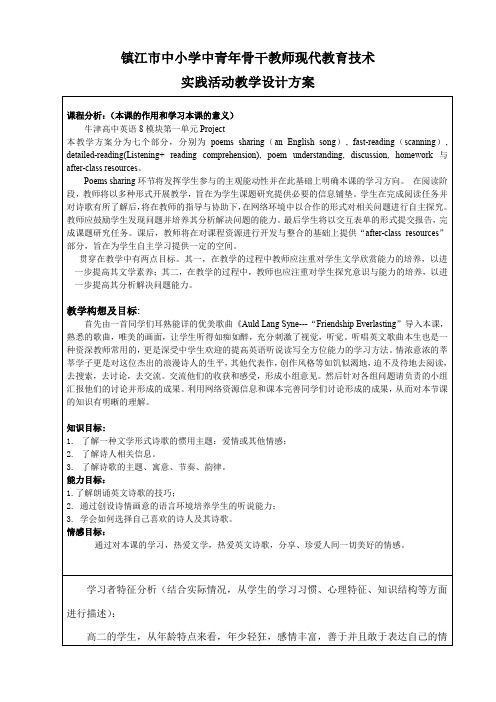
镇江市中小学中青年骨干教师现代教育技术实践活动教学设计方案课程分析:(本课的作用和学习本课的意义)牛津高中英语8模块第一单元Project本教学方案分为七个部分,分别为poems sharing(an English song), fast-reading(scanning), detailed-reading(Listening+ reading comprehension), poem understanding, discussion, homework与after-class resources。
Poems sharing环节将发挥学生参与的主观能动性并在此基础上明确本课的学习方向。
在阅读阶段,教师将以多种形式开展教学,旨在为学生课题研究提供必要的信息铺垫。
学生在完成阅读任务并对诗歌有所了解后,将在教师的指导与协助下,在网络环境中以合作的形式对相关问题进行自主探究。
教师应鼓励学生发现问题并培养其分析解决问题的能力。
最后学生将以交互表单的形式提交报告,完成课题研究任务。
课后,教师将在对课程资源进行开发与整合的基础上提供“after-class resources”部分,旨在为学生自主学习提供一定的空间。
贯穿在教学中有两点目标。
其一,在教学的过程中教师应注重对学生文学欣赏能力的培养,以进一步提高其文学素养;其二,在教学的过程中,教师也应注重对学生探究意识与能力的培养,以进一步提高其分析解决问题能力。
教学构想及目标:首先由一首同学们耳熟能详的优美歌曲《Auld Lang Syne---“Friendship Everlasting”导入本课,熟悉的歌曲,唯美的画面,让学生听得如痴如醉,充分刺激了视觉,听觉。
听唱英文歌曲本生也是一种资深教师常用的,更是深受中学生欢迎的提高英语听说读写全方位能力的学习方法。
情浓意浓的莘莘学子更是对这位杰出的浪漫诗人的生平,其他代表作,创作风格等如饥似渴地,迫不及待地去阅读,去搜索,去讨论,去交流。
牛津译林版高中英语选修模块八 选修模块8Unit1 Welcome教案-新版

牛津版选修8Unit1 Welcome教案Teaching aims1.Enable the students to talk about their opinions on reading books.2.Help the students learn how to talk about their ideas of different kinds of books. Teaching important and difficult pointsTeach the students to talk about differences between different kinds of books. Teaching methods:Talking and group-workTeaching procedures and ways:Step 1 Brief introduction of the unitIn this unit, you will◆read a student’s essay about appreciating literature and a student’s repo rt on Robert Burns◆ listen to information on how to write a literary review◆ discuss some classic literature and give your opinion on a literary review◆ write a literary review◆ recite a poemStep 2 Lead inWhat are the ways of entertainment?Show some pictures on the screen and get them to say:Watching TV, Listening to music, Reading books, Surfing the Internet,Attending concerts, Having holidays, Enjoying food and exerciseStep 3 BrainstormingWhat are the genres of literature?Do you know some famous writers? Who are they?What are the ways of reading?Step 4 Genres of literaturedrama, poetry, novels, short stories, science fictions…Step 5 Reading aloudThe Day We MetGary R. HessI met you on Valentines DayOne year five months twelve days I saw your faceYou came down from heaven andopened my eyesYour skin so smooth, so tenderSmile so bright, so lovingI have thought about youin every wayJust sitting and wonderingabout that dayWe laughed, we smiledWe talked for a long whileThat day with you was so greatAnd everyone passing is onlymore wonderfulI love you more now,than ever beforeQuestion:What kind of poem is this?Step 6 Picture talking1. Why might people want to join a book club?2. What are the different ways to read?3. Do you like science fiction? Can you name some science fiction books and their writers?4. Do you like reading or writing poem? Which poem is your favorite?Step 7 Discussion1. If you were asked to recommend a book to a friend, what book would you choose? Why?2. What are some of the differences between poetry and science fiction books?Characteristics of poetryemphasize rhythm, sound and imagery, express strong feelingsThemes of science fiction storiesWhat society might look like in the future, science discoveries, space travel?life on other planets, environmental changesNowadays, besides the traditional books, that is, books in print, do we have any other kinds of book?Advantages and disadvantages of e-booksE-books have a lot of advantages. They save a lot of space. A CD can store many books and it weighs just a few grams so that it is much easier to carry some CDs than to carry a heavy suitcase full of books in print when travelling or moving house. E-books provide people with a more personalized way of reading as the readers can set the pages, adjust the point size of the text or change the background colour. Some even provide a voice function so that people can ‘read’ their books by listening. Many people report that they read e-books faster than books in print. Besides, we can save a lot of trees because no paper will be used for e-books.However, as many other electronic gadgets, e-books have disadvantages as well. To read e-books, people must first have an electronic device that can display them. Besides, when reading e-books, people cannot make notes or comments on the margin as they can with books in print. More importantly, e-books available online may hurt copyright holders.3. Do you think that e-books will replace books in print?Step 8 Language points1. If you were asked to recommend a book to a friend, what book would you choose?1) subjunctive 2) recommend:2. Do you think that e-books will ever replace books in print? replaceHomework1. Find more information about classic literature.2. Unit Revision: Period 1.。
高中英语新牛津译林版精品教案《Reading(1):Home alone》1

ObectiveneStudent are emunication with e menta in their ive The LETTER munication b writing an e-mai to the e through ou but not from ou,And though the are with ou et the beong not to ou你的儿女,其实不是你的儿女他们是生命对于自身渴望而诞生的孩子他们借助你来到这世界,却非因你而来他们在你身旁,却并不属于你You ma give them our ove but not our thought,For the have their own thoughtYou ma houe their bodie but not their ou,For their ou dwe in the houe of tomorrow,which ou cannot viit, not even in our dreamYou ma trive to be ie them,but ee not to mae them ie ouFor ife goe not bacward nor tarrie with eterda你可以给予他们的是你的爱却不是你的想法因为他们有自己的思想你可以庇护的是他们的身体,却不是他们的灵魂因为他们的灵魂属于明天,属于你做梦也无法到达的明天你可以拼尽全力,变得像他们一样却不要让他们变得和你一样因为生命不会后退,也不在过去停留You are the bow from which our chidrena iving arrow are ent forthThe archer ee the mar uightthat Hi arrow ma go wift and farLet our bending in the archer' hand be for gadne;For even a He ove the arrow that fie,o He ove ao the bow that i tabe你是弓,儿女是从你那里射出的箭弓箭手望着未来之路上的箭靶他用尽力气将你拉开,使他的箭射得又快又远怀着快乐的心情,在弓箭手的手中弯曲吧因为他爱一路飞翔的箭,也爱无比稳定的弓HomeworI If ou were Dad, what woud ou fee when ou received our on' emai What woud ou write in our ree4 How to avoid ationII Recite the。
- 1、下载文档前请自行甄别文档内容的完整性,平台不提供额外的编辑、内容补充、找答案等附加服务。
- 2、"仅部分预览"的文档,不可在线预览部分如存在完整性等问题,可反馈申请退款(可完整预览的文档不适用该条件!)。
- 3、如文档侵犯您的权益,请联系客服反馈,我们会尽快为您处理(人工客服工作时间:9:00-18:30)。
Unit 1 Reading Appreciating Literature (模块八高二下)
Background Information:
Students: 40 Senior high school students, Grade 2
Lesson: Unit 1 Reading Appreciating Literature
Lesson duration: 45 mins
Teaching Objectives:
By the end of the lesson, students should be able to:
◊ be familiar with the new words and fully understand the text
◊ apply reading strategies while reading persuasive essays
◊ give a brief introduction to Charles Dickens and Great Expectations
◊ raise interest for classic literature
Teaching Contents:
A) key point: apply some useful reading strategies, e.g. skimming
B) difficult point: get to know the writing skills employed in the text
Teaching Aid: video,blackboard, chalk, PPT
Type of the Lesson: reading
Teaching Procedures:
Step 1: Lead-in (5 mins)
Movie-appreciation:
1) Show a 1-minute episode of the movie Great Expectations, and ask the students questions, as what do you know about the film? Have you ever read classic novels?...
2) Teacher comments
Purpose:to evoke students' interest, and lead in
Step 2: Fast Reading (7 mins)
Ask students to go through the passage as quickly as possible with some posed problems as follows:
◊What is classic literature?
◊Who is Charles Dickens?
◊How old is Pip when the story begins?
Purpose: to apply the strategy of skimming to get the main idea of the text
Step 3: Detailed Reading (25 mins)
1). Ask students to reread the text by themselves. Guess the meaning of new words from context and do the exercise on page 4.
Match the new word on the left with the correct meaning on the right.
1. antiques a. very quick and not expected
2. well received b. insisting on doing something
3. released c. valuable things from the past
4. abrupt d. liked by a lot of people
5. prejudice e. made available to the public
6. rigid f. difficult to change
7. civil g. preference that prevents true
c onsideration of a situation
8. bent on h. polite, good-mannered
2). Finish the exercise on PPT as follows:
Here are some words in Liz's essay that describe the main Elements of the novel. Match the elements on the left with correct examples on the right.
1. character a. mist
2. setting b.what is means to be a gentleman
3. symbol c. England in the early 1800s
4. theme d. Pip, Joe, Estalla
5. plot e. a stranger gives Pip a lot of money,then
Pip moves to London and becomes a snob
3). Let several students read each paragraph. The teacher analyses the
structure of the text and the way the writer adopts to write a persuasive
essay.
Purpose: to fully understand the text and master useful reading strategies as scanning, taking notes and guessing the meaning of a new word from context.
Step 4: Post-reading Activity(6mins)
Students shall work in pairs to practise the dialog on ppt:
A: Do you know anything about Charles Dickens?
B: Yes, I do. He is...
A: Oh, I see. He wrote many classic novels. Can you introduce one to me?
B: Sure. Great Expectations tells the story that...
Purpose: to help students learn how to summarize and output the information they've learned.
Step 5: Homework (2 mins)
After class, students are required to
1. finish exercises on page 5
2. find out more classic works by Charles Dickens and make a ppt to introduce them
to your classmates in tomorrow's class.
Purpose: to consolidate the knowledge that the students have learned, and
develop the ability of research.。
